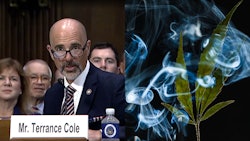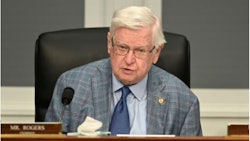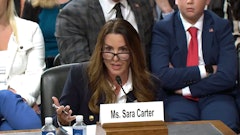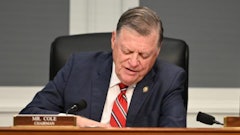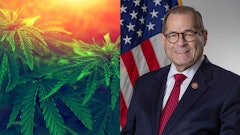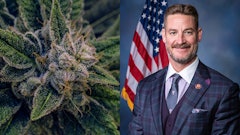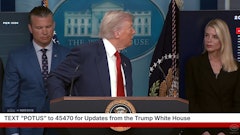
The U.S. Senate voted, 50-47, on July 22 to confirm President Donald Trump’s nomination of Terrance Cole to be the Drug Enforcement Administration (DEA) Administrator.
Cole, who just last year promoted an article claiming cannabis is linked to higher suicide risks for high schoolers, is now in the driver’s seat of the current cannabis rescheduling hearing process that’s been delayed for six months.
Under an order from DEA Chief Administrative Law Judge John J. Mulrooney II, Cole now has sole discretion on whether the hearing process, to debate the merits of a proposed rule to reclassify cannabis to Schedule III under the Controlled Substances Act, should resume.
Cole told U.S. senators during his April confirmation hearing that “it’ll be one of my first priorities” to review where the DEA is in the administrative process to reschedule cannabis upon being confirmed.
However, Cole provided no promises on the Schedule III proposal that was recommended by former President Joe Biden’s U.S. Department of Health and Human Services and published in the Federal Register after former Attorney General Merrick Garland signed off on a notice of proposed rulemaking. Biden’s DEA never backed the proposal.
Cole told members of the Senate Judiciary Committee that he’d give “the matter careful consideration after consulting with appropriate personnel within the Drug Enforcement Administration, familiarizing myself with the current status of the regulatory process, and reviewing all relevant information.”
Here’s how cannabis industry stakeholders reacted to Cole’s July 22 confirmation vote.
Aaron Smith, Co-Founder and CEO of the National Cannabis Industry Association – (In an Open Letter to Terrance Cole)
“Last year, we were honored to be designated by the DEA as one of the select participants in the agency’s public hearing process for the Notice of Proposed Rulemaking (NPRM) to move cannabis from Schedule I to Schedule III under the Controlled Substances Act.
“NCIA continues to believe that marijuana should not be subject to the Controlled Substances Act (CSA); rather, that marijuana products should be regulated under uniform product safety standards that apply equally to all licensed marijuana businesses and protect consumers across the country, developed under new federal law that recognizes that cannabinoid products cannot be governed under the same regulatory pathways that currently apply to pharmaceutical drugs, food, dietary supplements, alcohol, or tobacco.
“However, our association recognizes that the DEA has only been considering the rescheduling of marijuana. We are eager and ready to work with the DEA and Trump administration to, as you said during your confirmation hearing, ‘listen to the experts’ and ‘follow the science,’ which we are confident will lead to a change in marijuana’s status federally. The rescheduling process under the previous administration was unnecessarily protracted and fraught by allegations of malfeasance within DEA and we look forward to your renewed leadership to expedite this process and fulfill President Trump’s campaign promise to ‘unlock the medical uses of marijuana to a Schedule III drug’ and ultimately ‘implement smart regulations, while providing access for adults, to safe, tested product.’
“As such, we strongly encourage your office to continue advancing the cannabis rescheduling process in a timely and transparent manner. The recent recommendation by the Department of Health and Human Services to reclassify cannabis to Schedule III is grounded in the scientific, medical, and legal standards required by 21 U.S.C. § 811. Rescheduling would help eliminate unnecessary barriers to research, reduce burdens on legitimate businesses operating under state law, and bring federal policy more in line with overwhelming public opinion and decades of state-level reform.
“As DEA considers next steps, we respectfully urge your administration to recognize the importance of collaboration with stakeholders who can offer real-world insights into the public health, enforcement, and operational impacts of federal cannabis policy. NCIA and our members welcome any opportunity to be constructive partners in that effort.” - Aaron Smith
Kyle Sherman, Founder & CEO of Flowhub
“We’re watching the appointment of DEA Administrator Terrence Cole closely. While his background overseeing Virginia’s [Public Safety and Homeland Security] may seem encouraging, questions remain about the political motivations behind his selection. President Trump made clear just last week that this was a Governor Glenn Youngkin-backed appointment and publicly stated he would hold Youngkin accountable if Cole does not deliver. Youngkin, notably, has not been a supporter of the cannabis industry.
“Fortunately, Executive Order 14215, issued by President Trump in February 2025, ensures accountability at the federal level. Section 7 of that order explicitly prohibits agencies and their employees from issuing legal guidance or interpretations that deviate from those of the President and Attorney General. This safeguard exists to prevent political freelancing and keep federal policy aligned with the administration’s commitments.
“If Administrator Cole honors this Executive Order, the will of the public, the President’s promise to unlock safe access to medical cannabis through the reclassification of cannabis to a Schedule III drug, and his own promise to ‘listen to the experts’ and ‘follow the science’ as he testified during his nomination hearing, we’re hopeful he can be an agent of long overdue reform. But we’ll be watching closely.” – Kyle Sherman
Anthony Coniglio, CEO of NewLake Capital Partners
“The conversation around cannabis policy is again clouded by speculation. What we know is limited—but meaningful. Mr. Cole has said cannabis rescheduling will be ‘one of [his] first priorities,’ and that he will rely on science, expert consultation and the framework of the Controlled Substances Act to guide his decision.
“That’s not a political promise—it’s a procedural one. And in today’s regulatory climate, that matters.
“More telling is what Mr. Cole has made unequivocally clear: His focus will be on dismantling fentanyl networks and transnational criminal organizations. That aligns with the DEA’s 2025 National Drug Threat Assessment, which notably downplays cannabis and instead emphasizes synthetic drugs and the organized crime groups behind them. In that context, rescheduling cannabis isn’t just a policy adjustment—it’s a way for the DEA to better distinguish between bad actors and law-abiding, compliance-driven operators.
“Whether Mr. Cole will be a steward of regulatory modernization or a placeholder for the status quo remains to be seen. But the next 100 days offer a chance to turn a long-overdue page. If he leads with science and enforcement clarity—not outdated fears—this could be the start of a smarter, more modern drug policy.” -Anthony Coniglio
Terry Mendez, CEO of Safe Harbor Financial
“The Senate's advancement of Terrance Cole’s nomination as DEA Administrator is a consequential development for the cannabis industry. With the rescheduling of cannabis under federal law stalled, the incoming DEA leadership will play a defining role in whether that reform moves forward—or remains mired in uncertainty.
“While we welcome Terry Cole’s stated commitment to reviewing the rescheduling proposal, the industry needs more than vague assurances. We need regulatory clarity, fairness, and above all, urgency. The decisions ahead will directly impact the viability of thousands of licensed cannabis operators and the broader financial infrastructure supporting them.
“However, even in the most optimistic scenario where cannabis is rescheduled from Schedule I to Schedule III, we must be clear-eyed about the limitations of that change. Rescheduling does not equate to legalization. It will not eliminate the burdensome compliance regimes that currently deter most large financial institutions from entering the market. Anti-Money Laundering and Bank Secrecy Act requirements will still apply, and the cannabis industry will remain federally criminalized in practice—if not in label.
“Contrary to popular belief, banking services for cannabis businesses are not unavailable today—but they are fragmented, costly, and carried disproportionately by smaller, specialized institutions like Safe Harbor. Rescheduling might offer incremental improvements, but absent updated FinCEN guidance and comprehensive congressional action like the SAFER Banking Act, the financial exclusion of cannabis operators will continue.
“This is a moment to double down on the push for safe banking, tax equity and transparent regulatory treatment. At Safe Harbor, we are committed to ensuring that cannabis businesses—large and small—have access to the financial tools they need to thrive. We urge the new DEA leadership to move swiftly, and Congress to act decisively, so this industry can finally be treated as what it is: legal, regulated, and essential to communities across America.” -Terry Mendez










